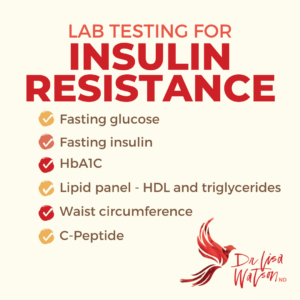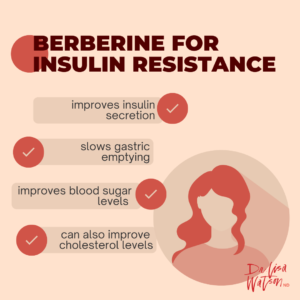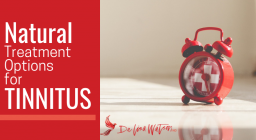
Seems like everywhere you turn right now, people are talking about insulin resistance. And I say Hallelujah to that! It is about time that we talk about this serious issue, impacting the health of millions, and putting people at risk of diabetes, obesity, heart disease, and metabolic syndrome.
So WTF is Insulin Resistance?
When we consume carbohydrates, our pancreas produces the hormone insulin to allow cells to uptake the sugar, taking it out of our bloodstream. When we consume more carbohydrate calories than our body can use, the pancreas has to make more insulin to try and get all the excess glucose out of bloodstream.
Eventually, our cells just can’t take up any more glucose. They stop responding to insulin and become “insulin resistant.” So blood sugar levels stay high, and our body keeps trying to lower them by producing more and more insulin. It’s a vicious circle.
And there are consequences.
- Fatigue – if our cells aren’t taking up sugars to create energy, we feel fatigued. Even though we have lots of circulating sugar in our bloodstream, we can’t use it.
- Sugar cravings – you are starving at a feast. Your body HAS all the glucose it could possibly need, but because your cells are not responding to insulin, the sugar isn’t entering cells. So your cells and brain send out the signal asking for more sugar – perpetuating the cycle.
- Weight gain – if our body can’t use the available sugars for energy, they are sent back to the liver and packaged up to be stored as fat. Fat that is most often deposited around our midsection.
- High blood sugar – high blood sugar can eventually lead to a diagnosis of diabetes.
- Increased inflammation – high levels of insulin in the body can disrupt cellular metabolism and increase inflammation.
Insulin Resistance in Perimenopause
Women in perimenopause are at an increased risk of developing insulin resistance. When our estrogen levels are more balanced during our monthly cycles, estrogen helps to sensitize our cells to insulin, reducing the chances that we will become resistant to insulin. During perimenopause when estrogen levels can fluctuate dramatically, we are more at risk of developing insulin resistance.
Additionally, many women in perimenopause are not engaging in the healthy lifestyle behaviours that reduce risk of insulin resistance such as regular exercise, reduced carbohydrate consumption, adequate dietary fiber, and maintenance of a healthy body weight.
Testing for insulin resistance
Yes. There are tests that can be done to assess for insulin resistance. Typically we look at fasting glucose, HbA1C, fasting insulin, and triglyceride levels to identify insulin resistance. Another useful test is C-peptide, a more stable measure of insulin production.Your medical doctor or naturopathic doctor can support you in getting these tests.
A less exact test, but one that research has shown to be useful, is taking your waist measurement. If a woman’s waist is over 88cm (35 inches) then she is at greater risk of insulin resistance.
How Do I Reverse Insulin Resistance?
The good news is that if you take action, you can reduce insulin resistance. You should speak to your health care professionals to get an individualized plan, but some of the key things to consider are:
- Increase dietary protein – this can help to provide alternate forms of energy for your body and improve your metabolism
- Reduce total intake of refined carbohydrates – simply cutting back on refined carbs, like breads, pastas, crackers, bagels, and white rice and replacing them with vegetables or whole grain options can reduce your total carbohydrate load and improve insulin resistance
- Eat your vegetables – seriously. Eat at least 6 (ideally more!) servings of vegetables every day. ½ cup is a serving of most vegetables. Aim to eat a rainbow – leafy greens, zucchini, peppers, mushrooms, broccoli, cauliflower, carrots, celery, peas, edamame – the list goes on and on!
- Fiber supplements – research has shown that having 5g of a psyllium based fiber supplement 15-20 minute before eating lunch and dinner can help to reverse insulin resistance, support weight loss, and be helpful in reducing cholesterol.
- Exercise – the benefits of exercise are not to be ignored. Not only can you help to reduce insulin resistance, but you can also help to prevent muscle mass loss (sarcopenia) which occurs during perimenopause and menopause. AND it’s one of the most effective antidepressants and mood lifters as well. 30-60 minutes of daily exercise is recommended in almost all studies of insulin resistance.
 Appropriate supplementation – you really need to discuss supplements with your naturopathic doctor, but the one that has the best research for insulin resistance is Berberine. Berberine has robust research showing benefits in lowering blood sugar levels. It works similar to many blood sugar stabilizing agents, and may be as effective as Metformin for reducing fasting blood sugar, HbA1C, and cholesterol.
Appropriate supplementation – you really need to discuss supplements with your naturopathic doctor, but the one that has the best research for insulin resistance is Berberine. Berberine has robust research showing benefits in lowering blood sugar levels. It works similar to many blood sugar stabilizing agents, and may be as effective as Metformin for reducing fasting blood sugar, HbA1C, and cholesterol.
Disclaimer
The advice provided in this article is for informational purposes only. It is meant to augment and not replace consultation with a licensed health care provider. Consultation with a Naturopathic Doctor or other primary care provider is recommended for anyone suffering from a health problem.
Select References
https://www.ncbi.nlm.nih.gov/pmc/articles/PMC558285/
















